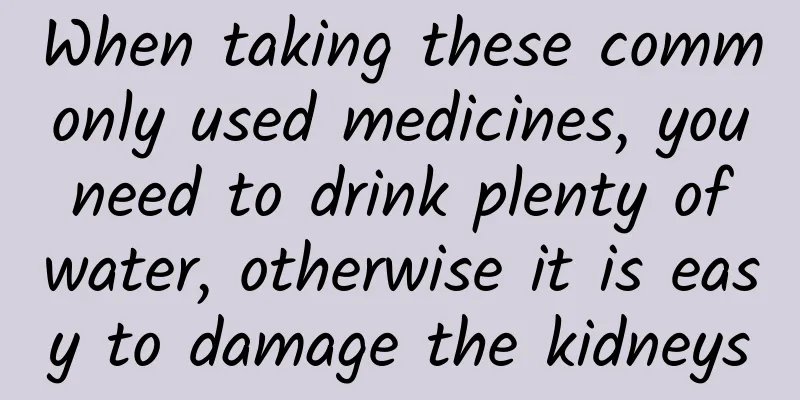When taking these commonly used medicines, you need to drink plenty of water, otherwise it is easy to damage the kidneys

|
During the night shift, a patient came to the pharmacy with a grimace and trudging steps to get painkillers. He said that his blood uric acid level was too high and he had gout. After taking uric acid-lowering drugs for a period of time, he developed kidney stones and was in great pain. Huazi asked him if he drank more water while taking the medicine. The patient said that he drank a lot of water when his blood uric acid level was high before, but after taking the medicine, his blood uric acid level dropped and he didn't drink much water. Huazi told the patient that his kidney stones were most likely caused by not drinking enough water after taking uric acid-lowering medication. 1. Most drugs need to be excreted through the kidneys. After most drugs enter the human body, there are two main ways of excretion. One way is directly through the kidneys and excreted out of the body through urine; the other way is to be metabolized by the liver first, and then the metabolites pass through the kidneys and are excreted out of the body through urine. Some drugs are also excreted through feces, breathing, sweat, etc. But in general, the metabolic process of most drugs ultimately needs to pass through the kidneys and be excreted through urine. When taking medicine, the amount of urine will affect the concentration of the drug in the urine. If the urine volume is too little, the drug concentration in the urine will be too high, causing damage to the kidneys. 2. Commonly used drugs that require drinking more water 1. Uric acid-lowering drugs: Commonly used drugs include allopurinol and febuxostat, which reduce uric acid production, and benzbromarone, which increases uric acid excretion. Allopurinol and febuxostat reduce the production of uric acid from xanthine, causing an increase in the concentration of xanthine in urine; febuxostat increases the concentration of uric acid in urine. During the medication period, you need to drink more than 2000 ml of water every day, otherwise it is easy to induce xanthine stones or uric acid stones. 2. Antipyretic and analgesic drugs: Common antipyretic drugs include acetaminophen, ibuprofen, high-dose aspirin, etc. When taking them, you should drink more water. When taking antipyretic drugs, you will sweat a lot to lower your body temperature, and you will lose a lot of water, so you need to replenish water. In addition, high concentrations of such drugs will irritate the gastric mucosa. Drinking a lot of water when taking the drugs can dilute the drug concentration and reduce adverse reactions. 3. Antibacterial drugs: Various sulfonamide antibiotics and various quinolone antibiotics such as "xacin" have high concentrations in urine. When the urine volume is insufficient, they are prone to precipitate crystals and cause damage to the kidneys. Aminoglycoside antibiotics such as gentamicin, tobramycin, and amikacin are nephrotoxic, so you need to drink more water to dilute the urine and promote drug excretion. 4. Antiviral drugs: Acyclovir, famciclovir and other drugs used to treat viruses are excreted through the kidneys. During medication, you need to increase your water intake to avoid drug crystallization and kidney damage. 5. Bisphosphonates: Drugs such as alendronate and clodronate disodium used to treat osteoporosis and hypercalcemia may cause electrolyte imbalance and dehydration, so you should pay attention to drinking enough water during medication. In addition, bisphosphonates are irritating to the esophagus, so you need to take them with at least 200 ml of water, and keep your upper body upright for 30 minutes after taking them. 3. Drink more water in the right way For normal adults, drinking about 2000 ml of water a day is enough to meet the requirement of "drinking more water". However, if the weather is hot, if you sweat a lot due to strenuous exercise, or if you have diarrhea, you should drink more water appropriately. For people with gout and high blood uric acid, the daily water intake can reach 3000ml~4000ml. Don't worry that drinking too much water will damage your kidneys. The human kidneys have great potential. As long as the kidney function is normal, drinking more water is beneficial to the kidneys and can "flushed" the urinary system. Be careful when drinking water. Do not drink a lot of water in a short period of time, otherwise it will suddenly increase the amount of circulating blood and increase cardiovascular risk. The correct way to drink water is to divide 2000ml of water into several portions and drink it in small sips throughout the day. To sum up, the excretion of most drugs needs to go through the kidneys. If the urine volume is too small, the drug concentration in the urine will be too high, which can easily cause damage to the kidneys, and it is also easy to precipitate crystals and induce stones. Therefore, when taking medicine, unless there are special requirements, try to drink more water to protect the kidneys. If you have any questions about the medicine, consult a doctor or pharmacist in time. I am pharmacist Huazi. Welcome to follow me and share more health knowledge. |
Recommend
What is the difference between pineapple beer and beer? Is pineapple beer acidic or alkaline?
Pineapple beer is a light yellow, clear, transpar...
What are the precautions for women before getting an IUD?
Although the country has now fully opened up the ...
6 simple tips for women to replenish blood
The first thing we look at when we look at a pers...
What is the treatment for breast cancer?
Breast cancer is a very common cancer among women...
Why should babies learn etiquette? When should we teach babies etiquette?
There is an old saying in my country that "y...
Why does the vaginal discharge smell fishy?
Diseases of the sexual reproductive system are gy...
How to tie a gauze waist belt
After giving birth, women will have particularly ...
Nipple pain, no breast pain
Some female friends often experience nipple pain ...
What to do if you have bleeding during the fourth month of pregnancy
Many pregnant women have problems during pregnanc...
How long does it take for the dot-shaped embryo to be visible?
Pregnancy is an exciting thing, especially for fa...
Is it painful to have a routine vaginal discharge check?
If a woman finds any abnormality in her leucorrhe...
Prevention and Control Guide | How Much Do You Know About the Novel Coronavirus
The coronavirus that is spreading this time is a ...
Is it true that women have secondary development?
Women all love beauty. Many women always complain...
Protect your child's teeth, don't ignore these 4 types of food
When babies have tooth decay, many parents often ...









